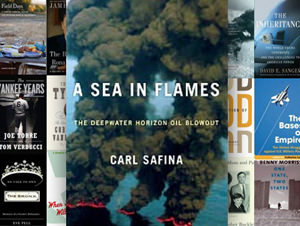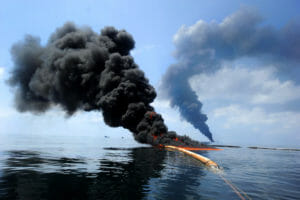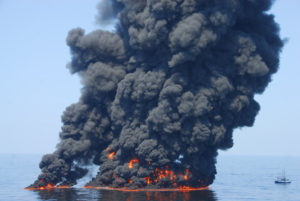The Disastrous Cost of Oil Addiction
"The 2010 Gulf of Mexico blowout brought more than oil to the surface," writes Carl Safina in his new book investigating the impact of the BP Deepwater Horizon blowout.In "A Sea in Flames," Carl Safina investigates the impact of the BP Deepwater Horizon blowout.
Not since Rachel Carson wrote her sea trilogy — “Under the Sea-wind,” “The Sea Around Us” and “The Edge of the Sea” — has a conservationist written about marine ecosystems with the factual elegance of Carl Safina. His 1997 book “Song for the Blue Ocean” jarred readers about the tragic diminution of numerous fish species: bluefin tuna, white marlin, swordfish. Safina, a marine biologist, has positioned himself as a protector of the seas, a man in communion with dolphins and whales. Other Safina books have dealt with leatherback turtles, Laysan albatross, shellfish stocks — any and everything that grapples with the health of the world’s oceans.
In “A Sea in Flames,” his newest installment, Safina investigates the impact of the BP Deepwater Horizon blowout. There isn’t much politics in this cogent analysis. Whether the Obama administration acted quickly enough during the crisis isn’t Safina’s primary concern, though his profiles of several key players are riveting. His kinship is with two tribes of people: gulf fishermen and marine biologists. “Crucial mistakes, disastrous consequences, the weakness of power, unpreparedness and overreaction, the quiet dignity of everyday heroes,” he writes. “The 2010 Gulf of Mexico blowout brought more than oil to the surface.”
Safina uses the spill, which gushed about 4.9 million barrels of crude for three months and killed 11 men, as a national learning moment. To villainize BP CEO Tony Hayward, he argues, misses the larger point: The industrial nations of the world are recklessly destroying oceans everywhere. Look in the mirror, he suggests: The culprit is all of us fossil-fuel addicts.
Back in 2008 around 300 exploratory wells were dug in the deep water of the Gulf of Mexico. Very few Americans questioned the environmental damage inherent in such activity. “Our everyday use of fossil fuels is changing the atmosphere,” Safina warns, “ruining the world’s oceans.” He garners credibility by being evenhanded. Doing some complicated math, he argues that the mixing of millions of gallons of BP oil with the Gulf’s 660 quadrillion gallons of water allowed the oil to easily dilute. But the carbon dioxide we’re emitting into the atmosphere, he scolds, isn’t being diluted. It’s building up in an extremely toxic way.
Safina suggests that the oceans are Earth’s lungs and they’re smoking two packs of cigarettes a day. Sea water is getting more acidic due to carbon dioxide. This spells dire consequences for oceans, which are losing habitats ranging from glaciers to tropical reefs at an astonishing rate. “Because we’ve bet the house on burning oil, coal, and gas,” he writes, “our atmosphere’s concentration of carbon dioxide is a third higher now than at the start of the Industrial Revolution.”
At the end of “A Sea in Flames,” Safina is desperate to close the deal against fossil fuels. His previously steady and nuanced prose turns polemical. He reminds us that oil is making undemocratic countries like Russia, Iran and Saudi Arabia powerful. Petro dictators, he charges, are stoking anti-Americanism all over the world. If we don’t get behind a Marshall Plan-like program for renewable energy, it seems, China will surpass America as the world’s superpower.
Carbon dioxide, the killer of Earth, can be slain only by consumers who are aware of how hideous oil, coal and gas truly are to the atmosphere and oceans, Safina argues. The smartest way to respond to the Gulf disaster shouldn’t have been cleaning birds or picking up turtles or spraying 1.84 million gallons of Corexit 9500. Instead, an infuriated citizenry should have pulled the subsidies out from under Big Petroleum. Tax the oil conglomerates out of business. It’s still not too late. Better to be, as Safina puts it, “shocked at the pump” than dead in the water.
Douglas Brinkley is a professor of history at Rice University. His most recent book is “The Quiet World: Saving Alaska’s Wilderness Kingdom 1879-1960.”
(c) 2011, Washington Post Book World Service/ Washington Post Writers Group
Your support matters…Independent journalism is under threat and overshadowed by heavily funded mainstream media.
You can help level the playing field. Become a member.
Your tax-deductible contribution keeps us digging beneath the headlines to give you thought-provoking, investigative reporting and analysis that unearths what's really happening- without compromise.
Give today to support our courageous, independent journalists.






You need to be a supporter to comment.
There are currently no responses to this article.
Be the first to respond.